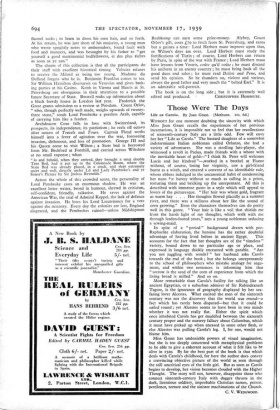Those Were The Days
Life as Carola. By Joan Grant. (Methuen. los. 6d.)
WITHOUT for one moment doubting the sincerity with which Miss Joan Grant recalls the experiences of her previous incarnations, it is impossible not to feel that her recollections
of sixteenth-century Italy are a little odd. Few will envy her her " Life as Carola." The bastard daughter of a somewhat indeterminate Italian nobleman called Orlanzo, she had a variety of adventures. She was a strolling lute-player, she witnessed a revolt in Padua, made friends with a whore with the inevitable heart of gold—" I think St. Peter will welcome Lucia and her kindred "—,worked in a brothel at Fiume without, of course, losing her virginity, saw a girl-friend burnt as a witch, and entered a convent of no identifiable rule, whose abbess indulged in the uncanonical habit of condemning her nuns f^0 heresy without so much as calling in a priest, torturing them and bricking up the unrepentant. All this is described with immense gusto in a style which will appeal to lovers of the picturesque. " Her hair was wheat gold, fragrant as warm hay . . . Her thoughts flowed placidly as a summer river, and there was a stillness about her like the sound of corn growing." Even the characters themselves can do pretty well in this genre. " Your hair is like a veil that shields me from the harsh light of my thoughts, which walk with me through leaden-footed years," says a young nobleman seducing a sewing-maid.
In spite of a " period " background drawn with pre- Raphaelite elaboration, the heroine has the rather doubtful advantage of having lived before in ancient Egypt. This accounts for the fact that her thoughts are of the " timeless " variety, bound down to no particular age or place, and expressed in language thickly encrusted with parable. " Are you not juggling with words? " her husband asks Carola towards the end of the book ; but she belongs unrepentantly to the school of philosophers who mistake analogy for argu- ment, and within two sentences is informing him that " sorrow is the seed of the corn of experience from which the living bread is milled." And so on.
More remarkable than Carola's facility for talking like an ancient Egyptian, or a suburban admirer of Sir Rabindranath Tagore, is the ignorance of geography displayed by her sea-
faring lover Alcestes. What excited the men of the sixteenth century was not the discovery that the world was round—a fact which has rarely been disputed—but that it could be sailed round ; yet Alcestes seems to have been in two minds whether it was not really flat. Either the spirit which once inhabited Carola has got muddled between the sixteenth century proper and the nursery fallacy about Columbus, which it must have picked up when encased in some other flesh, or else Alcestes was pulling Carola's leg. I, for one, would not blame him.
Miss Grant has undeniable powers of visual imagination, but she is too deeply concerned with metaphysical problems to be able to give a coherent account of what it felt like to be alive in 1520. By far the best part of the book is that which deals with Carola's childhood, for here the author does convey a convincing objective picture of the world as. seen through the still uncritical eyes of the little girl. But as soon as Carola begins to develop, her vision becomes clouded with the Higher Thought. The story will not, however, disappoint those who connect sixteenth-century Italy with dagger thrusts in the dark, licentious soldiery, improbable Christian names, poison, pestilence, torture and the sinister machinations of the Church.
C V. WEDGWOOD.




































































 Previous page
Previous page